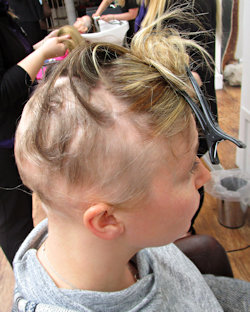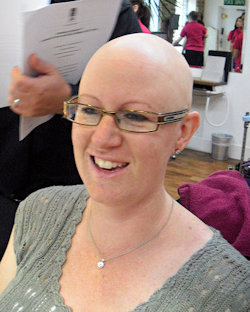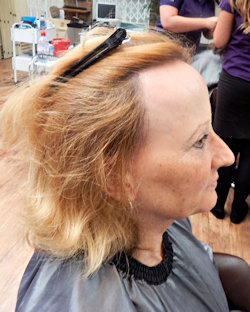We frequently have to tell women that there is no cure for Alopecia Areata – and that is still the case. But there is finally a treatment which has some prospect of success in reducing its worst effects.
Litfulo
A new drug called Litfulo is now available from Pfizer and was approved in November 2023 for use in the UK by the Medicines and Healthcare products Regulatory Agency (MHRA) for severe alopecia areata in patients 12 years and older. It has also recently been approved by the US and Canadian health authorities.
It’s the trade name of a drug with the tongue-twisting pharmaceutical name ritlecitinib, and is a type of drug known as enzyme inhibitors – it essentially reduces the activity of two types of enzymes which cause inflammation in the hair follicles.
It may not work for everyone, although it has shown promise in clinical studies – in Pfizer’s study of 718 people, 31% of those who had at least 50% hair loss improved to only 20% hair loss after taking the drug for five and a half months.
Drawbacks and side-effects
However before you get your hopes up too much there are some drawbacks.
- Firstly it is very expensive – the cost in the US is expected to be an eye-watering $49,000 for a years supply. There is no word yet whether it will ever be offered on the NHS, but at that price it seems unlikely.
- Secondly it appears that if you stop taking it the likelihood is that the alopecia will return, so it’s not a cure and the cost is not a one-off expense.
- Thirdly there are some side-effects – increased risk of contracting infections, including upper respiratory infections and tuberculosis, headaches, dizziness, diarrhoea, and folliculitis.
However it is at least a first step towards an effective treatment – and that’s something we haven’t had before now – so there is hope for the future.

 This is one of the most commonly reported types of hair loss, referring to bald patches or spots on the scalp.(areata simply mean patchy)
This is one of the most commonly reported types of hair loss, referring to bald patches or spots on the scalp.(areata simply mean patchy) This version of alopecia affects the whole of the head, often including eyelashes and eyebrows.
This version of alopecia affects the whole of the head, often including eyelashes and eyebrows. Also known as Scarring Alopecia or Cicatricial Alopecia, it was only identified as recently as 1994 but seems to be becoming more common.
Also known as Scarring Alopecia or Cicatricial Alopecia, it was only identified as recently as 1994 but seems to be becoming more common.
 For some women what matters is looking and feeling good in specific circumstances while for others it’s an overall feeling of confidence that’s the key consideration. If you are happy to remove a wig when you get home or go to bed then that may suit you best, but if you want to be able to forget about your hair loss and get back to a full-time normal feeling then it’s likely that a hair system will be a far better solution.
For some women what matters is looking and feeling good in specific circumstances while for others it’s an overall feeling of confidence that’s the key consideration. If you are happy to remove a wig when you get home or go to bed then that may suit you best, but if you want to be able to forget about your hair loss and get back to a full-time normal feeling then it’s likely that a hair system will be a far better solution.